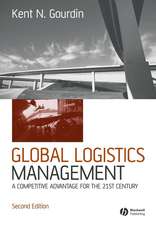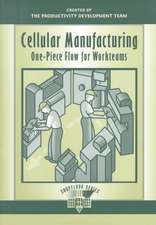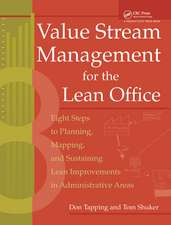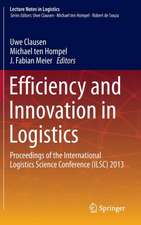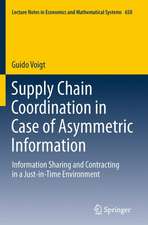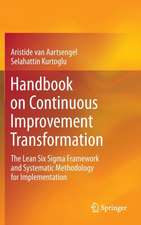Capacity and Inventory Planning for Make-to-Order Production Systems: The Impact of a Customer Required Lead Time Distribution: Lecture Notes in Economics and Mathematical Systems, cartea 671
Autor Klaus Altendorferen Limba Engleză Paperback – 16 aug 2013
Din seria Lecture Notes in Economics and Mathematical Systems
-
 Preț: 360.02 lei
Preț: 360.02 lei -
 Preț: 383.93 lei
Preț: 383.93 lei - 15%
 Preț: 693.39 lei
Preț: 693.39 lei -
 Preț: 384.09 lei
Preț: 384.09 lei -
 Preț: 380.07 lei
Preț: 380.07 lei -
 Preț: 446.26 lei
Preț: 446.26 lei -
 Preț: 497.37 lei
Preț: 497.37 lei -
 Preț: 380.84 lei
Preț: 380.84 lei -
 Preț: 384.86 lei
Preț: 384.86 lei -
 Preț: 378.34 lei
Preț: 378.34 lei -
 Preț: 399.67 lei
Preț: 399.67 lei - 20%
 Preț: 360.93 lei
Preț: 360.93 lei - 15%
 Preț: 643.16 lei
Preț: 643.16 lei -
 Preț: 379.09 lei
Preț: 379.09 lei -
 Preț: 404.76 lei
Preț: 404.76 lei -
 Preț: 385.62 lei
Preț: 385.62 lei - 15%
 Preț: 644.49 lei
Preț: 644.49 lei -
 Preț: 379.09 lei
Preț: 379.09 lei -
 Preț: 345.50 lei
Preț: 345.50 lei -
 Preț: 425.80 lei
Preț: 425.80 lei -
 Preț: 378.34 lei
Preț: 378.34 lei - 18%
 Preț: 775.65 lei
Preț: 775.65 lei -
 Preț: 392.60 lei
Preț: 392.60 lei -
 Preț: 401.61 lei
Preț: 401.61 lei - 15%
 Preț: 646.43 lei
Preț: 646.43 lei -
 Preț: 382.18 lei
Preț: 382.18 lei -
 Preț: 378.34 lei
Preț: 378.34 lei - 15%
 Preț: 637.59 lei
Preț: 637.59 lei - 15%
 Preț: 647.27 lei
Preț: 647.27 lei -
 Preț: 377.73 lei
Preț: 377.73 lei -
 Preț: 447.84 lei
Preț: 447.84 lei - 15%
 Preț: 644.49 lei
Preț: 644.49 lei -
 Preț: 386.00 lei
Preț: 386.00 lei - 15%
 Preț: 654.43 lei
Preț: 654.43 lei -
 Preț: 415.02 lei
Preț: 415.02 lei -
 Preț: 411.54 lei
Preț: 411.54 lei -
 Preț: 398.92 lei
Preț: 398.92 lei -
 Preț: 398.92 lei
Preț: 398.92 lei -
 Preț: 392.75 lei
Preț: 392.75 lei - 15%
 Preț: 635.47 lei
Preț: 635.47 lei - 20%
 Preț: 653.56 lei
Preț: 653.56 lei -
 Preț: 379.86 lei
Preț: 379.86 lei -
 Preț: 495.46 lei
Preț: 495.46 lei -
 Preț: 447.99 lei
Preț: 447.99 lei -
 Preț: 378.71 lei
Preț: 378.71 lei - 15%
 Preț: 637.13 lei
Preț: 637.13 lei -
 Preț: 385.84 lei
Preț: 385.84 lei -
 Preț: 378.54 lei
Preț: 378.54 lei - 15%
 Preț: 666.55 lei
Preț: 666.55 lei
Preț: 413.27 lei
Nou
Puncte Express: 620
Preț estimativ în valută:
79.08€ • 84.56$ • 65.93£
79.08€ • 84.56$ • 65.93£
Carte tipărită la comandă
Livrare economică 18 aprilie-02 mai
Preluare comenzi: 021 569.72.76
Specificații
ISBN-13: 9783319008424
ISBN-10: 3319008420
Pagini: 156
Ilustrații: XV, 138 p. 30 illus.
Dimensiuni: 155 x 235 x 8 mm
Greutate: 0.23 kg
Ediția:2014
Editura: Springer International Publishing
Colecția Springer
Seria Lecture Notes in Economics and Mathematical Systems
Locul publicării:Cham, Switzerland
ISBN-10: 3319008420
Pagini: 156
Ilustrații: XV, 138 p. 30 illus.
Dimensiuni: 155 x 235 x 8 mm
Greutate: 0.23 kg
Ediția:2014
Editura: Springer International Publishing
Colecția Springer
Seria Lecture Notes in Economics and Mathematical Systems
Locul publicării:Cham, Switzerland
Public țintă
ResearchCuprins
Introduction.- Literature Review.- Single-Stage Service Level and Tardiness Model.- Simultaneous Capacity and Planned Lead Time Optimization.- Optimal Composition of Number and Size of Machines.- Service Level Constraint Models.- Conclusion.
Recenzii
From the reviews:
“This book comprises a collection of four research papers the author prepared during his time as a Ph.D. student at University of Vienna. … Using simple queueing models, this thesis aims at deriving analytical expressions for performance measures and insights derived from those. It will inspire future work on production control and manufacturing systems design with a particular emphasis on customer requirements. This book summarizes state-of-the-art insights to capacity and inventory planning and will be useful to students and practitioners.” (P. R. Parthasarathy, Mathematical Reviews, March, 2014)
“This book comprises a collection of four research papers the author prepared during his time as a Ph.D. student at University of Vienna. … Using simple queueing models, this thesis aims at deriving analytical expressions for performance measures and insights derived from those. It will inspire future work on production control and manufacturing systems design with a particular emphasis on customer requirements. This book summarizes state-of-the-art insights to capacity and inventory planning and will be useful to students and practitioners.” (P. R. Parthasarathy, Mathematical Reviews, March, 2014)
Notă biografică
Klaus Altendorfer is Professor for Production and Operations Management at the University of Applied Sciences Upper Austria. He received a PhD in Logistics and Operations Management from the University of Vienna, Austria. Stochastic modelling of production systems, production economics and simulation for production planning improvement are his research topics.
Textul de pe ultima copertă
The book presents different models for the simultaneous optimization problem of capacity investment and work release rule parameterization. The overall costs are minimized either including backorder costs or considering a service level constraint. The available literature is extended with the integration of a distributed customer required lead time in addition to the actual demand distribution. Furthermore, an endogenous production lead time is introduced. Different models for make-to-order production systems with one or multiple serial processing stages are developed. Capacity investment is linked to the processing rates of the machines or to the number of the machines. Results are equations for service level, tardiness, and FGI lead time in such a production system. For special cases with M/M/1 and M/M/s queues explicit solutions of the optimization problems or optimality conditions concerning capacity investment and work release rule parameterization are provided.
Caracteristici
Identifies inventory reduction potentials for MTO production systems Develops equations and model frameworks as well as explicitly solved optimization problems that can easily be adopted by researchers Explains how the understanding of the influence of customer required lead time supports capacity and inventory decisions






